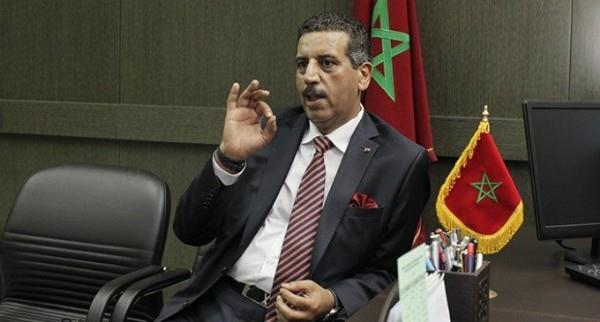
403
Sorry!!
Error! We're sorry, but the page you were looking for doesn't exist.
BCIJ Head Deplores Algeria's Unwillingness to Cooperate on Terrorism Issues
(MENAFN- Morocco World News) Rabat - Abdelhak Khiame, Head of Morocco's Central Bureau of Judicial Investigations (BCIJ) has once again deplored Algeria's unwillingness to cooperate on security issues relating to counterterrorism. Underscoring the importance of security cooperation, Khiam said in an interview given to the French-based newspaper, Le Monde, that Morocco has anti-terrorism partnerships with international security sources. The interview given to Le Monde is set to be published on Wednesday, according to Maghreb Arab Press (MAP). Khiam said that Morocco works with its partners effectively through exchanging information about bi-nationals tied with terrorist cells, including the so-called Islamic State (ISIS). "We have liaison officers in the partner countries and Western liaison officers are in Morocco," he said. Khiam, however, has expressed his concerns over the lack of cooperation between Morocco and its eastern neighbor. 'The problem is the absence of collaboration of the Algerians and the existence of an area controlled by a terrorist group," he said, referring to the Polisario Front. Khiam said that al-Qaeda in the Islamic Maghreb is still controlling southern Algeria and Mali, which is a threat to Morocco and the entire region. According to the BCIJ head 'even if there are differences [between the two organizations], they defend the same ideology.' This is not the first time when Khiam expressed his deep concerns over the region. In April 2017, Khiam told French TV Channel France 24, that since terrorism is a transnational threat, regional cooperation is very important. Deploring the lack of cooperation between Morocco and Algeria in security affairs, Khiam said that coordination with countries such as Mauritania is strong. But, with Algeria it is another story, adding that the Eastern neighbor is not that cooperation. BCIJ Achievements and Strategy as Highlighted by Khiam The BCIJ chief has also discussed Morocco's strategy to counter-terrorism and his bureau's achievements. In the interview, Khiam told Le Monde, that the counter-terror bureau has managed to dismantle 49 terror cells since 2015. Forty-four of the 49 terror cells dismantled since 2016 had direct links to the so-called Islamic State (ISI). According to the BCIJ chief, 772 people linked to the Islamic State (ISIS) were arrested since the creation of BCIJ in 2015. Khiam told Le Monde that 97 fighters, who returned from conflict zones, were also arrested. Eighty-four people of the arrested members returned from Iraq and Syria, while 13 were returned from Libya. Fifty-three other individuals were turned back by other countries were also arrested. Khiam has also mentioned the 7-member terror cell, which was operating in the cities of Tangier and Meknes. The cell was arrested on February 1. The BCIJ head added that Morocco's strategy to counter terrorism has been reinforced as a law adopted in 2015 stipulates that anyone has rallied or attempted to join a region where a terrorist cell is operation has to be questioned, and brought to justice. Such suspects, according to Khyam, might be sentenced to up to fifteen years jail terms. After Morocco has introduced the biometric ID card and passport and the reinforcement of border controls ' we have had no more departures," said Khiam, adding terror cells rely on internet to spread radicalized ideologies. Le Monde has also discussed the case of Moroccan-born bi-nationals involved in terrorist attacks that affected Europe. To respond to the newspaper questions, the official stated some possible factors that contributed to this situation, including the lack of appropriate laws to arrest suspects, according to MAP. Recalling the 2015 attacks in Paris and Brussels (2016), Khiam said that the 'police knew that some individuals had gone to conflict zones, but in the absence of legal texts, they could not interrogate them.' He added that many of the young bi-nationals who committed terrorist acts were radicalized in prisons, adding that this explains that they were not integrated well into a certain society. Khiam added that ISIS members usually target zones, where civil wars are taking place to settle down. This poses a threat to Morocco and the entire region, he said, adding that the country is exchanging information with several countries in order to make the suspects' arrest"

Legal Disclaimer:
MENAFN provides the
information “as is” without warranty of any kind. We do not accept
any responsibility or liability for the accuracy, content, images,
videos, licenses, completeness, legality, or reliability of the information
contained in this article. If you have any complaints or copyright
issues related to this article, kindly contact the provider above.


















Comments
No comment